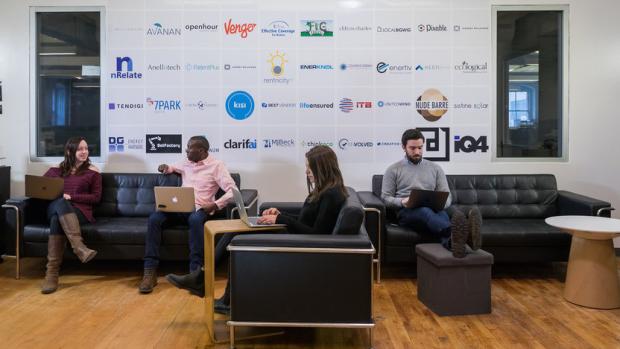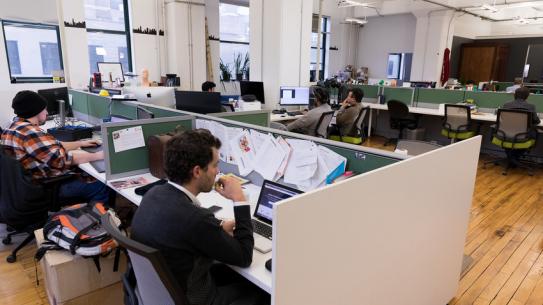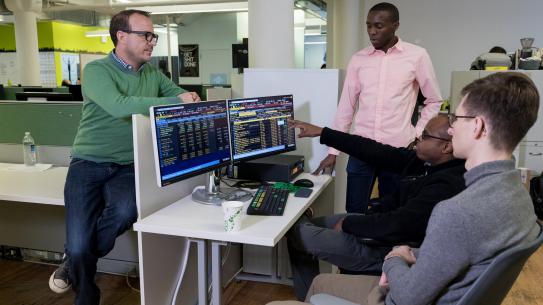Do Tech Incubators Work? NYU Tandon Future Labs Answer: 3,200 Jobs and $4 Billion for New York

The Data Future Lab, part of NYU Tandon's network of startup business hubs known as the Future Labs
BROOKLYN, New York – NYU Tandon School of Engineering's Future Labs — a network of startup business hubs that includes the Data, Urban, Digital, and recently launched Veterans Future Lab — today reported an estimated economic impact on New York City’s economy of $4.06 billion since launching in 2009 as the first incubators with city support through the New York City Economic Development Corporation (NYCEDC).
In addition to the extraordinary monetary impact, the NYU Tandon Future Labs supported 3,201 jobs in New York State, including 2,740 jobs in New York City. BJH Advisors conducted the survey, commissioned by the school. The jobs total includes participating companies, a small program staff, and businesses that graduated from the Future Labs.
The NYU Tandon Future Labs program was conceived to encourage a culture of entrepreneurship at the university and throughout New York City, which was not the epicenter of tech entrepreneurship in 2009 that it is today. One measure of the growth of the city’s startup ecosystem is venture capital, which often funds thriving startups: VC deals for city-based companies increased eight-fold and funding rose by nearly 25 times, to more than $12 billion, since 2009, the year in which the NYCEDC tapped NYU Tandon to launch the first university-affiliated incubator with City support.
The early success of the incubator program was recognized when, in 2013, New York State named the program a New York State Certified Business Incubator. This program, administered by Empire State Development, provides supports the incubators as they foster a culture of innovation and success not just in New York City but throughout the entire state.
From the beginning, NYU Tandon’s startup hubs provided guidance, resources, and community to emerging companies in New York City. The Future Labs grew in scope beyond merely incubating startup companies at one location to encompass a wide range of programs and education for the entrepreneurial community. Today, four sites strategically span the city, from the SoHo neighborhood of Manhattan to three Brooklyn locations along the Innovation Coastline — DUMBO, Downtown Brooklyn, and Sunset Park’s Industry City. Together, the Future Labs comprise the largest university-led startup ecosystem in New York City. Future Labs companies and graduates are valued at $1 billion.

“Silicon Valley and Boston long ago illustrated the importance of strong engineering universities in developing vibrant centers of tech entrepreneurship,” said Kurt H. Becker, NYU Tandon vice dean for research, innovation and entrepreneurship. “We are proud of the role that NYU Tandon and our Future Labs have played as New York grew to become one the fastest growing tech entrepreneurship hubs in the country. Our Faculty-Engineers in Residence work with cutting-edge emerging technologies in the Future Labs and they, in turn, learn from these entrepreneurs, as they collaborate on exciting projects. Our students, too, benefit from exposure to the entrepreneurial culture, which has inspired many to pursue jobs with startups or to found companies themselves.”
“Time and time again our academic institutions have served as major economic drivers, launching a new generation of companies in New York City,” said New York City Economic Development Corporation President and CEO James Patchett. “We are proud to have worked with NYU Tandon to help found the first City-funded incubator in the city, which has been a hotbed for innovation, job creation, and opportunity. The impact of NYU Tandon’s Future Labs further proves that public-private partnerships are critical to real economic growth.”
Ninety-five companies have successfully completed the incubation program, including
- BounceX, which develops behavioral marketing tools, has grown to employ more than 260 employees;
- Honest Buildings, which offers a digital management platform for real estate owners, raised $21 million in Series B funding during 2017;
- Geometric Intelligence, acquired last year by Uber to become the base of its artificial intelligence laboratory, was noteworthy among the 15 successful acquisitions of Future Labs companies in 2017;
- Other prominent graduates of the Future Labs contribute to the network’s reputation for a remarkable survival rate of 90 percent among all graduates: CB Insights, which employed technology to become one of the most trusted sources of market intelligence on the startup ecosystem, and Clarifai, which brings its expertise in artificial intelligence to bear on image recognition, are just two more examples.

“In the last year, the Future Labs and our companies reached significant milestones. We started with news of Uber acquiring Geometric Intelligence, and throughout the year, significant rounds of investment closed by current and graduate companies. In this single year, the Future Labs economic output totaled $1.2 billion,” said Steve Kuyan, NYU Tandon managing director at the Future Labs. “We’re beginning 2018 dedicated to expanding support for our entrepreneurs and opening our network resources and benefits to a broader base of companies in New York City.”
The Future Labs last year also opened the Veterans Future Lab to support the nation’s military veterans with entrepreneurial aspirations; added to its numerous international collaborations that bring entrepreneurs to New York City; and significantly expanded its role in clean energy, clean technology, and artificial intelligence.
Highlights from 2017 include:
Veterans Future Lab
Launched in November 2017 and supported by Barclays with Empire State Development Corporation, the U.S. Small Business Administration, the Brooklyn Chamber of Commerce, and New York Assembly Member Joseph R. Lentol, the Veterans Future Lab is the first hub in the NYU Tandon Future Labs network that offers support to not only technology startups but a wide range of businesses that military veterans, active duty personnel, and their spouses want to launch. They receive entrepreneurial training from experienced staff, including Barclays executives; no-cost office space; access to the facility’s prototyping space; and other rigorous support that is a cornerstone of the Future Labs. The prototyping and light manufacturing equipment at the site is also available to the Sunset Park, Brooklyn, community.
An initial three companies are already making their home at the Veterans Future Lab. In May 2018, the Veterans Future Lab will accept the first full cohort of companies for its incubation program, called Apex. Based upon successful incubation techniques at the other Future Labs, Apex will support founders for 12 months instead of the typical 24 at the other NYU Tandon incubators, with the goal of helping them grow sufficiently to enter one of the Future Labs programs for more advanced startups. That is because the Veterans Future Lab accepts very early-stage startups as well as the established ones typically accepted into other Future Labs incubation programs. Up to ten teams will be selected. Application deadline is April 2, 2018.
“Barclays is honored to be partnering with NYU Tandon in making a deeper impact in the community by leveraging our capital, skills, expertise, and mentorship to help enable veteran entrepreneurs to launch and grow their ventures at the Veterans Future Lab,” said Jes Staley, Barclays group chief executive officer.
Data and Digital Future Labs
As artificial intelligence accelerated out of research laboratories and into commercial applications, in 2017 the Future Labs helped cement New York’s role as a hub of AI by graduating nine companies from its very first accelerator program, the AI NexusLab, supported by ff Venture Capital. The success of these first two cohorts can be measured in the outcomes for these very early-stage companies: Six graduated to the Future Labs, two returned to their countries of origin, and one was acquired.
Two AI Summit events in 2017 drew thought-leading speakers and hundreds of New Yorkers to explore the future of the technology.
The Future Labs also collaborated with Verizon to produce a series of seminars exploring cutting-edge research and commercial trends in artificial intelligence and mixed reality — both augmented and virtual reality technology. Called Focus: AI and Focus: MR, the two-lecture series attracted practitioners and academics throughout greater New York.
The Urban Future Lab and ACRE
The Urban Future Lab, home to emerging companies developing solutions for energy efficiency and sustainability, continued its excellent 90 percent successful incubation rate at ACRE, New York City’s leading cleantech and clean energy incubator.
With companies like Dandelion, offering affordable geothermal heating and cooling installations for homes, and Project Economics, which manages NYC’s first large community solar installation, ACRE is having a dramatic impact on reducing the city’s carbon footprint.
“The acquisition of EV Box by ENGIE, the French multinational electric utility, would be reason enough to celebrate 2017, but that was just the beginning. I continue to be impressed by the outstanding technology and business model innovation developed within our hub,” said Pat Sapinsley, managing director of cleantech initiatives at the Urban Future Lab. “New York is becoming the epicenter for the green economy and our companies are playing significant roles in the industry’s evolution. As we enter 2018, we can rely on ACRE members and graduates to help reduce carbon emissions, expand renewable energy, and leave a lasting impact on the environmental landscape of the entire country.”
ACRE proved to be a good investment, as well: For every dollar the New York State Energy Research and Development Authority (NYSERDA) invested in ACRE during the first phase of grant funding, its companies raised $100 in project finance and venture capital from the private markets.
NYSERDA was the founding sponsor of ACRE — one of seven incubators that NYSERDA supports today, each offering commercialization resources, technical assistance and business development support to early-stage companies to help them reach key milestones and accelerate their time to market. In 2017, ACRE received an additional $2 million commitment from NYSERDA for its operations over the next four years. Its investment will enable ACRE’s companies to continue developing clean-energy technologies.
Alicia Barton, NYSERDA president and CEO, said, “New York is at the forefront of the global energy transition, and our state-supported incubators, such as ACRE, are fostering the growth of a new generation of cutting-edge companies that put New York squarely on the global map as a hub for cleantech innovation. Governor Cuomo’s investment in emerging clean-energy companies has already leveraged more than $320 million in private investment while creating more than 1,000 jobs statewide and spurring dozens of new products into the marketplace.”
The NYU Tandon Urban Future Labs mission extends beyond the companies incubating at ACRE — it supports the entire city’s renewable energy and resiliency startup community.
The most dramatic example is the Urban Future Competition, which on February 22, 2018, will award admission to ACRE and $50,000 to each of the most promising companies in three categories: Smart Grid, Smart Cities, and Smart Mobility. The Urban Future Competition, funded by NYSERDA, NY Community Trust, and BP Ventures, aims to bring the very best young companies from around the globe to New York, and it has developed into one of the world’s most competitive incubation challenges for companies in these sectors. Such large non-dilutive awards are rare in the entrepreneurial world, and the track records of ACRE graduates have generated international attention.
The Urban Future Lab is also home to one of the country’s few proof-of-concept centers; PowerBridgeNY works with other universities and academics throughout the Northeast to accelerate the adoption of cleantech research in the commercial market. It also offers the Clean Start Diploma Program for professionals who seek to transition to management positions in the sector.
START-UP NY
In 2017, the ACRE startup Dandelion was accepted into START-UP NY, and another START-UP NY company, the video-sharing platform Bubbl, was acquired. Dandelion joins three other Future Labs companies assisted by START-UP NY, a New York State program offering new and expanding businesses the opportunity to operate tax-free for 10 years on eligible university or college campuses in the state:
- CARMERA, a Digital Future Lab company that maps information for autonomous vehicles and other uses;
- FINDMINE, a Data Future Lab company that uses artificial intelligence to increase sales for the fashion industry; and
- Paperspace, a Digital Future Lab company that develops cloud computing infrastructure.
Visit NYU Tandon Future Labs for more information.
Note: Images available at http://dam.engineering.nyu.edu/?c=2043&k=1eeaa1f255
About the New York University Tandon School of Engineering
The NYU Tandon School of Engineering dates to 1854, the founding date for both the New York University School of Civil Engineering and Architecture and the Brooklyn Collegiate and Polytechnic Institute (widely known as Brooklyn Poly). A January 2014 merger created a comprehensive school of education and research in engineering and applied sciences, rooted in a tradition of invention and entrepreneurship and dedicated to furthering technology in service to society. In addition to its main location in Brooklyn, NYU Tandon collaborates with other schools within NYU, the country’s largest private research university, and is closely connected to engineering programs at NYU Abu Dhabi and NYU Shanghai. It operates Future Labs focused on start-up businesses in downtown Manhattan and Brooklyn and an award-winning online graduate program. For more information, visit engineering.nyu.edu.




